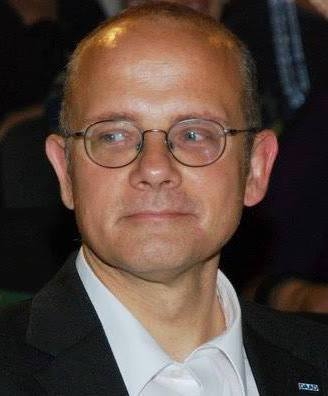The example of Dugin illustrates that, as a result of the idiosyncratic conception of generic fascism in post-Soviet Russia, it is sufficient to rhetorically dissociate oneself from the worst crimes of Nazi Germany and to refrain from blatantly copying Nazi symbols in order to avoid public stigmatization as a “fascist”. This approach would, at least, explain why, on the one hand, obviously neo-Nazi groups such as the Russian National Unity of Aleksandr Barkashov or skinhead gangs are being vocally suppressed by the executive and judiciary, while on the other hand ultra-nationalist writers who, in terms of their rhetoric, are no less radical are not only tolerated, but have unhindered access to public platforms and state-controlled media, and are, sometimes, allocated an active role in PR projects of the Kremlin’s political technologists.
1984 – Déjà vu
Another factor in favor of Dugin and similar publicists is the return of the Russian leadership to quasi-Orwellian forms of organizing public discourse. Government-controlled political reporting in the mass media has become a succession of national-patriotic happenings in which international developments of any kind – whether a Russia-China summit or Russian athletes’ performance at the Olympics, the “Orange Revolution” or foreign success of a Russian fantasy movie – are exaggerated into either collective triumphs or shared humiliations of the Russian nation under its faithful leadership. The attendant superficiality and emotionality of public debates, which occasionally degenerate into bizarre shouting matches between participants of political television shows, replace serious analysis. Political commentaries are fixated on the “here and now” which, in the case of Dugin, may have contributed to that his well-known neo-fascist stance during the 1990s has been “forgotten.” The mantra-like disparagement of the West that accompanies the agitational realignment of foreign news reporting increases the playing field for the propagation of anti-Western slogans which also furthers the spread of extremist ideas proposed by Dugin and theorists with similar leanings.
Outlook
Will the newfound sensitivity towards nationalist tendencies lead to a sustained return to tolerant and liberal aspects of Russia’s political tradition? Or is this new tendency no more than the latest episode in Moscow’s fluctuating media campaigns?
One can identify two contrary trends – one ideological, the other pragmatic – whose collision has restored a certain measure of controversy to the generally dull public discourse in Russia. On the one hand, the dualist worldview introduced by Putin’s entourage in the past few years – the simple, but honest Russians struggling for independence against a devious, soulless, imperialist West – fulfils an important role in legitimating the “tough” course of the resurging Russia. However, the officially approved paranoia also opens the floodgates for radical conclusions. Since the US model of society is presented as the antithesis of Russian civilization, one should not be surprised when youth gangs of violent thugs try to prevent an “Americanization” of Russian society, in their way. The damage caused by such reactions to the international image of Russia is, in turn, incompatible with the equally strong tendency towards establishing the country as a respected partner of the Western countries and as becoming a part of the “civilized world” (the preferred Russian term for the economically advanced democratic states). Besides, the leadership of the Kremlin appears to be considering large-scale immigration as a way of replenishing the rapidly dwindling population of the Russian Federation, which would create new, potentially explosive, tensions. Finally, the fanatical anti-Americanism and pro-Iranian positions of Dugin as well as others are in contradiction to a number of security policy preferences of the Kremlin and its efforts to join the international coalition against terrorism as a full member. Due to these and other challenges in the coming years, the – at least partial – handover of power last month gains some importance. It will be interesting to see which of the two contradictory tendencies currently present in Russia – the nationalist anti-Western one, or the urge to become integrated into international formal and informal networks – will gain the upper hand.
(Note: You can view every article as one long page if you sign up as an Advocate Member, or higher).





